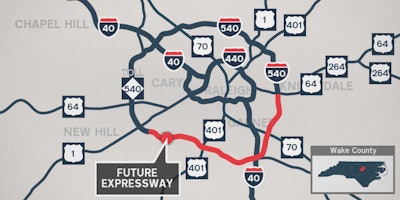 The map above shows the 540 extension’s general location. Credit: NCDOT
The map above shows the 540 extension’s general location. Credit: NCDOTEnvironmental groups have filed a petition challenging the planned path of a future outer loop around Raleigh, North Carolina, due to concerns about the effect on nearby waterways that are home to endangered mussels.
The $2.2 billion toll highway, an extension of N.C. 540, would complete the southern portion of an expressway outer loop. The construction contract for the first phase was awarded in December, and the N.C. Division of Water Quality recently issued an environmental permit for the project.
The Southern Environmental Law Center, along with other environmental groups, is petitioning for an administrative hearing to challenge the environmental permit.
The SELC says the proposed highway would “tear through 57,000 linear feet of streams and 70 acres of wetlands.” The groups are also concerned about increased stormwater runoff from the additional pavement from the highway, as well as more greenhouse emissions degrading the area’s air quality.
“The toll highway will result in devastating impacts to the natural and human environment, and we are disappointed to see what amounts to a rubber-stamp approval of a project that deserves much greater scrutiny,” says SELC Senior Attorney Kym Hunter.
The petition follows a federal lawsuit filed by SELC last year against the U.S. Fish & Wildlife Service for its approval of the project.
Business groups and local governments in the area back the road project and see it as a top transportation priority for the region, according to The (Raleigh) News & Observer. An N.C. Turnpike Authority spokesperson tells the newspaper that construction could start by the end of the year on the first phase and said the agency could not comment on the petition.
The first phase of the road is slated to open to traffic in 2023, according to the N.C. Department of Transportation. The six-lane expressway is planned to eventually extend 28 miles from the N.C. 55 Bypass in Apex to the U.S. 64/264 Bypass (I-495) in Knightdale. It is to be built in three phases. The contract for the final phase is currently scheduled for 2027.









